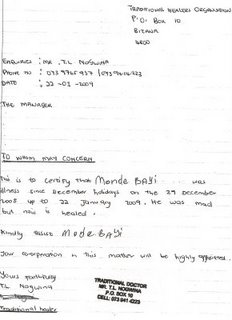June 2nd, 2009 by Geeta Nayyar, M.D. in Expert Interviews, Medblogger Shout Outs
Tags: Adoption, Chief Technology Officer, CIO, EHR, Electronic Medical Records, EMR, Health IT, HIT, PHR, Physician Training, Vivek Kundra
9 Comments »
I attended the 29th annual Management of Change (MOC) Conference with Dr. Val. The conference is sponsored by the American Council for Technology and the Industry Advisory Council. MOC brings together government and industry leaders to share knowledge, collaborate, and develop actionable technology management strategies. As a physician, attending this conference for the first time, I assumed a great deal of the conference topics would be over my head and in very “techie” terms. My hope was to get a glimpse of some of the technology solutions the government was considering as they relate to health care IT.
Vivek Kundra, first Chief Information Officer of the United States, addressed the audience early in the day in language that even a doc could understand. He spoke about the need to simplify government, and connect people to solutions, instead of “endless bureaucracies.” The same of course goes for medicine. How great would it be to connect our patients to systems that actually had interoperable medical data?
I was able to catch up with Mr. Kundra after his talk for a few minutes and ask him how technological simplification would apply to physicians such as myself, operating in a haphazard infrastructure with varying PAC systems, EMR’s and paper charts. He said the key would not only be investing in technology, but investing in training healthcare personnel to master new technologies. He acknowledged that different generations of physicians would embrace technology differently, but ultimately, if a physician says he “can do a better job on paper” then we have a problem.
I was very impressed by Mr. Kundra’s answer namely because it was so insightful for a man who’s expertise lies primarily in the technology field. He does not come from a healthcare background, and yet had hit the nail on the head. There has been so much talk about HIT being the “key” to cost savings and the next “breakthrough” in medicine. With very little discussion on how physicians feel about it. For some docs – particularly those that come from an older generation – the thought is quite terrifying. They are happy with their paper charts and manual dictations. Health technology is almost viewed as an impediment to those set in their ways, and accustomed to a system that has worked for them and their patients for years. This upheaval will not come without it’s challenges even after we find the best technologies for the tasks at hand. It will be imperative for government leaders to understand that the mission of HIT implementation may be just as difficult as finding the technology solutions they are currently seeking.
As Mr. Kundra and his team embark on this huge task, it will be important for physicians and health care personnel to engage with the government and serve as a guide for what docs need from technology, and what will and will not work for our patients. I hope next year’s conference is attended by more physicians such as myself and Dr. Val.
April 26th, 2009 by Dr. Val Jones in Humor, Medblogger Shout Outs
Tags: Blog Rally, Blogger, Dr. Val Jones, Free Speech, Paul Levy, Roxana Saberia
2 Comments »

This post is republished from Paul Levy’s blog. Please feel free to repost and distribute to raise awareness of those who do not enjoy free speech:
Thanks to T at Notes of an Anesthesioboist for getting this going, a group of bloggers is holding a blog rally in support of Roxana Saberi, who is spending her birthday on a hunger strike in Tehran’s Evin Prison, where she has been incarcerated for espionage. According to NPR, “The Iranian Political Prisoners Association lists hundreds of people whose names you would be even less likely to recognize: students, bloggers, dissidents, and others who, in a society that lacks a free press, dare to practice free expression.”
Hearing reports like these has prompted us to do a ribbon campaign. Blue for blogging.
Please consider placing a blue ribbon on your blog or website this week in honor of the journalists, bloggers, students, and writers who are imprisoned in Evin Prison, nicknamed “Evin University,” and other prisons around the world, for speaking and writing down their thoughts. Also, please ask others to join our blog rally
April 12th, 2009 by Dr. Val Jones in Medblogger Shout Outs
Tags: All Things Amanzi, Bongi, Book of Joe, Happy Hospitalist, Humor
No Comments »
Some fascinating posts from our blogging colleagues this week…
1. First up, Better Health’s favorite South African surgeon, Bongi, describes how his government is planning to credential traditional healers as physicians. He offers a sample of their history and physical forms:

Check out the comments section of this blog post for more commentary. Apparently “evidence-based medicine” is not honored in the US or in South Africa.
2. Happy, the cantankerous hospitalist, discusses the cold, hard facts about the costs of healthcare, and suggests that we should ration care based on personal lifestyle decisions. In other words, smokers who get lung cancer should not be eligible for Medicare. Check out the comments section for one very spicy conversation.
3. Anesthesiologist Joe, from the Book of Joe, always has interesting tidbits on his blog. My favorite three of the week: 1) A Silicon Valley baby onesie, 2) A Chanel bag made of beef jerky, and 3) a black bear sleeping bag. Check them out! (Here’s a sneak preview of the bear:)

April 8th, 2009 by Dr. Val Jones in Medblogger Shout Outs, News
Tags: CONNECT, EMR, federal agencies, Free, HIMSS, HIMSS09, Interoperability, National Health Information Network, NHIN, open-source, software
No Comments »
Tim Cromwell’s mother-in-law is 86 years old. Her husband is a Korean War veteran who developed Alzheimer’s disease, and receives care from both the VA and private healthcare providers. Because she and her husband take so many medications, they actually replaced their dining room table centerpiece with a collection of orange and white pill bottles. Mrs. Spencer keeps a hard copy of all of her husband’s medical records in a large file box that she carries with her on a cart with wheels. She has no alternative for keeping all her husband’s providers up to date with his complex care, and lifting and transporting the records has become more difficult for her in her eighth decade.
If this story sounds all too familiar, then you’ll be glad to know that the government is facilitating electronic medical and pharmacy records portability. One day it may be possible for Americans to dispose of those hard copy files, knowing that any provider anywhere can access their records as requested.
Tim Cromwell is passionate about alleviating his mother-in-law’s need to carry medical records around, and believes the way to do this is through the US Department of Veterans Affairs’ participation in the Nationwide Health Information Network (NHIN). Working in compliance with NHIN standards, the Federal Health Architecture group recently oversaw the creation of software (called CONNECT) that creates a seamless, secure and private interface with hospitals, and over 20 federal agencies’ medical records systems (including the Social Security Administration, Department of Defense, Veterans Affairs, the Centers for Disease Control and Prevention, and the National Cancer Institute).
On April 6, 2009, NHIN released the CONNECT software necessary to make Electronic Medical Records systems interoperable. The software is “open-source” and free to all who’d like to incorporate it into their EMRs. Those who add the free software will be able to share data with NHIN’s member groups, which include early adopters like the Cleveland Clinic, Kaiser Permanente, Beth Israel Deaconness Medcial Center, and MedVirginia.
This means that if Mrs. Spencer and her husband receive their care from participating hospitals and federal programs, they’ll never have to tote paper records again. But it may take some nudging from patients and healthcare professionals like you to grow the network. If you’d like your hospital to participate in the NHIN network, encourage them to view the NHIN website here.
March 7th, 2009 by Dr. Val Jones in Medblogger Shout Outs, Quackery Exposed
Tags: Dean Ornish, Dr. Benway, Healthcare reform, Integrative Medicine, Orac, Respectful Insolence, Stimulus Bill
2 Comments »
Dean Ornish writes:
…let’s use science to evaluate ideas that might seem a little weird or offbeat, but deciding a priori that an idea is stupid or worthless just because it doesn’t fit the conventional paradigm is, in my humble opinion, the epitome of being unscientific.
Dr. Benway responds:
There’s weird and then there is weird.
Diet and excercise affecting cancer? Plausible.
Naturopathy? Weird.
Subluxations? Homeopathy? Delusional.
MDs selling self-branded supplements? Embarrassing.
Chelation and coffee enemas for kids with autism? Evil.
I believe you are the plausible wrapping paper surrounding a coalition of crazy, weird, embarrasing, and evil ideas that some want to “integrate” into the universal health care bill.












